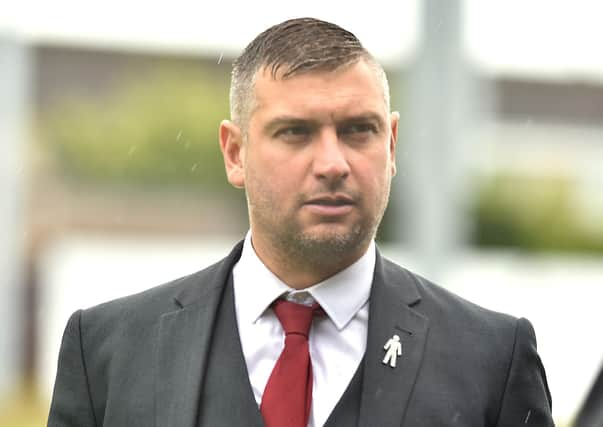Portadown thinking outside the box with training drills to help protect players from injury risk


The issue of injury created by a sudden and sustained stop to regular team training sessions and matchdays as part of the Coronavirus lockdown is an area of concern raised by Portadown manager Matthew Tipton.
The world of sport, attempting to adjust to an ever-changing landscape, stands as one social aspect affected by guidelines designed to protect lives under the current health crisis.
Advertisement
Hide AdAdvertisement
Hide AdA bid to bridge the gap between the benefits of a traditional training structure and reality of the current limitations created by a lockdown on social gatherings is one area of adjustment Tipton and his colleagues must attempt to address.
“It’s a different situation to the summer break as that follows at the end of a season, when you are gearing up for an initial rest and prepared both mentally and physically for that change,” said Tipton. “Obviously this is completely different, so it’s about fine-tuning everything possible to ensure players limit the drop in conditioning.
“As a manager, there’s a specific duty of care to my players.
“There is an increased risk of injury if someone attempts to jump straight back into competitive football after an extended period away from the right training.
Advertisement
Hide AdAdvertisement
Hide Ad“The potential for picking up injuries could prove high at a time many players will be coming out of contract and, potentially, seeking new clubs or with European qualifying games on the schedule or a shorter turnaround heading to pre-season.
“We have devised individual football-specific drills designed to incorporate twisting and turning or short bursts of speed, rather than simply running for miles at a time.
“We manage our players’ gametime and training over the course of a regular season - building up from pre-season towards peak fitness, keeping a measure of minutes with the goal to have as many in top condition as possible at the right time.
“Our injury record has been pretty good this season, in terms of muscular problems and time out, thanks to the expertise of club physio Chris Loughran and Jay Ludlow is also on board for nutritional advice.
Advertisement
Hide AdAdvertisement
Hide Ad“But training and how we manage everything is also vital, with the objective to have our players at a certain condition and with as few injury issues as possible ahead of what would have been our run-in over the final league games.
“You cannot replicate the same results from individual training as working together in groups at a team session - so it is about altering everything and re-evaluating to fill those gaps within the limitations.
“Essentially, we work off the basis it can take around three months to hit peak fitness but for every week off training, you potentially drop by four weeks in terms of conditioning.
“That’s obviously not an exact science but some indication, we feel, of the drop-off rate and it does show what clubs will be faced with once they return.
Advertisement
Hide AdAdvertisement
Hide Ad“For example, on a matchday we would see players clocking up around 1,000 metres in sprints per game, with our GPS system designating a sprint at moving five metres per second.
“So our drills are designed to get around 800 metres in sprints built into the individual sessions at present, with lots of short bursts, twists and turns and even curve running to help with power.”
Another aspect to the loss of routine is the loss of that crucial camaraderie.
“We send our training sessions and drills into the under 20s and youth players from a certain age, so we are all in it together as much as possible thanks to the technology,” said Tipton. “It is hard for everyone not having the routine football provides around training and matchdays.
Advertisement
Hide AdAdvertisement
Hide Ad“We do not bombard players with lots of information, it’s about repetition and maximising results.
“Children do not go into school and study multiplication tables once then never again - they work on the lesson until it takes hold.
“It is the same with football.
“Tactically, we use repetition to reinforce ideas and send out match reports on opponents to players.
“Some like the support and background, others prefer to trust their own experience and instincts.
“But it is about offering information and options.
Advertisement
Hide AdAdvertisement
Hide Ad“You need specific training for specific positions - a striker sprints more often but then has longer recovery periods than a midfielder running in a different way, with defenders more often back-tracking and moving side-to-side.
“Because players cannot attend the gym, we have sent out bodyweight programmes they can do at home.
“Distance running can be good for a player’s mental health and some of our drills may no longer work as parks or grass areas get closed off.
“Hopefully, our plans help limit the impact on player fitness and also keep us all on the same page as part of the one club.”